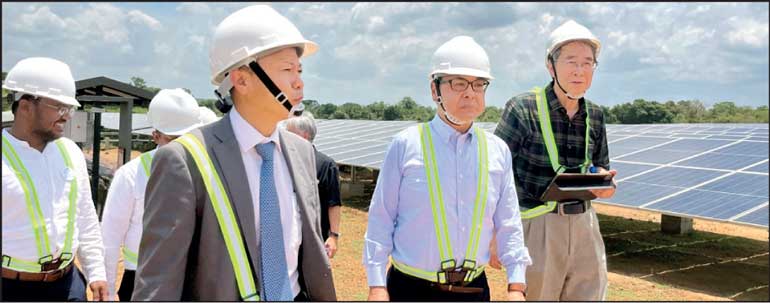Japanese Ambassador Mizukoshi Hideaki earlier this week attended the opening ceremony of the Kebithigollewa solar power plant, the first project under the Joint Crediting Mechanism (JCM), along with Power and Energy Secretary Dr. Sulakshana Jayawardena, Shibata Corporation Co., Ltd. President Shibata Tatsuhiro, and Windforce PLC Managing Director Manjula Perera.
In his address, Ambassador Mizukoshi highlighted the significance of the Kebithigollewa solar power plant as a major achievement in the bilateral cooperation between Japan and Sri Lanka. The solar plant, which is the first project under the JCM in Sri Lanka, represents a pivotal step in advancing renewable energy and underscores the commitment of both nations to sustainable development.
Established through a Memorandum of Cooperation in October 2022, the JCM supports projects that reduce greenhouse gas emissions and promote low-carbon technologies. The successful completion of this solar power plant by Shibata Corporation and Windforce PLC exemplifies the positive impact of the JCM framework.
The plant will deliver clean, sustainable energy, reduce dependence on fossil fuels, and contribute to Sri Lanka’s energy security and environmental objectives. Additionally, it will create local employment opportunities, including for women, thereby supporting community development.
The JCM not only addresses environmental challenges but also plays a crucial role in promoting Japanese investment in Sri Lanka. By facilitating the transfer of advanced technologies and expertise, the JCM strengthens economic ties and fosters mutual growth. This project serves as a model for future collaborations, demonstrating how sustainable initiatives can drive both environmental and economic benefits.
While reiterating the importance of the JCM, Ambassador Mizukoshi also noted Japan’s continued support in the power sector through Yen Loan projects, including the ongoing transmission line construction. These projects utilise Japan’s low-loss transmission technology to reduce CO2 emissions and enhance the efficiency of Sri Lanka’s power supply system. The decision to resume the Yen Loans on 24 July further underscores Japan’s commitment to supporting Sri Lanka’s energy infrastructure.
The Embassy of Japan in Sri Lanka expressed its sincere gratitude to all parties involved in this project. This achievement marks a promising beginning for further joint initiatives under the JCM, supporting Sri Lanka in its renewable energy goals and fostering a greener future.
FT

